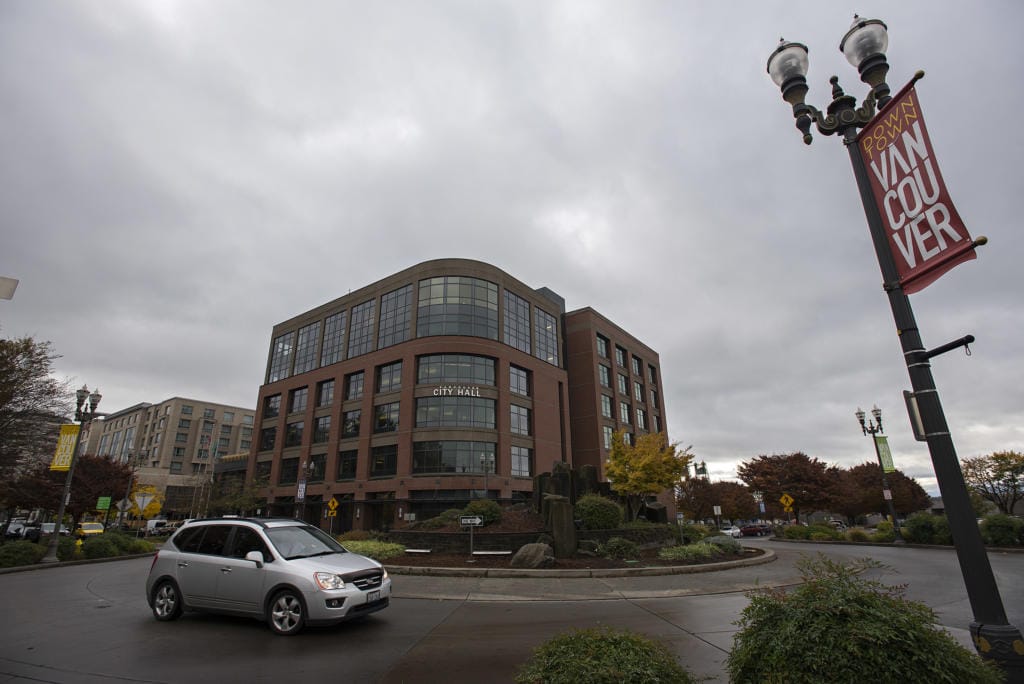The city of Vancouver is reassessing how it spends its transportation dollars after the Washington State Supreme Court struck down a voter-approved $30 car tab initiative earlier this month.
Initiative 976 would have gutted the city’s street paving fund. When it passed last year, city transportation planners scrambled to whittle down their budget by around $1 million. But now, with the unanimous decision from the court, that money is back in the city’s coffers.
Streets and Transportation Manager Ryan Lopossa told the city council Monday evening that he’d like to see some of that reinstated money shift to a new pot: from the street paving fund to a program aimed at improving multimodal safety and accessibility. That reallocation would benefit cyclists, pedestrians and other types of road users.
“I’m proposing we take a piece of that and put that over to safety and accessibility,” Lopossa said.
“(Initiative) 976, when that was passed, one of the first things we had to do was take $1 million out of our pavement program because of that projected loss in revenue. And so with that being undone, we’re able to put that $1 million back. What I’m suggesting is we take $400,000 of that million and we put that in the Multimodal Safety and Accessibility Program.”
Lopossa suggested to the council that they plan to set aside the $400,000 for four years.
High on the list of priorities for upcoming multimodal projects is improving ADA accessibility along Northeast 18th Street and North Devine Road, Long Range Planning Manager Rebecca Kennedy said, which would cost an estimated $500,000.
Kennedy also recommended that the city enhance the pedestrian crossings on Northeast Fourth Plain Boulevard east of Fort Vancouver Way, which comes with an estimated $750,000 price tag.
“At least for the foreseeable future, we want to offer up some potential next steps on how we could get some more of these Multimodal Safety and Accessibility projects done, at least over maybe the next couple of bienniums,” Lopossa said.
The transportation funding discussion was part of a broader conversation about the city’s proposed 2021-22 biennial budget.
The city council will continue to tweak and revise the draft budget until it formally votes on the package. A first reading is scheduled for its Nov. 9 meeting, followed by a public hearing the following week.
A few of the councilors expressed support for Lopossa and Kennedy’s proposal Monday evening.
“I really appreciate seeing this pivot today,” Councilor Sarah Fox said.
How would I-976 have impacted Vancouver?
In 2015, Vancouver established a Transportation Benefit District, or TBD, to improve the declining pavement condition across 1,900 lane miles of city streets. Vancouver’s $40 annual vehicle license fee amounted to more than half of the district’s annual budget.
They’d been slowly making progress over the last four years, Lopossa said, bringing the city’s average pavement condition index (a broad measurement of the state of the streets) up from 68 to 73, or from “fair” to “satisfactory.”
Enter I-976, which would forbid Washington’s cities from tacking their own local fees onto car tabs. It would have all but eliminated the city’s TBD as well as the grant dollars the local fund attracted — in 2018, for example, Vancouver leveraged $3.8 million in car tab fees to attract $8.4 million in federal and state grants.
The situation looked so dire that the city council took the unusual step of formally condemning the initiative ahead of the 2019 election. It was the first time the nonpartisan body had taken a formal position on a state ballot measure in nearly a decade.
But I-976 did pass, statewide 53 percent to 47 percent, and by a commanding 21-point margin in Clark County.
Nearly a year later, on Oct. 15, the state supreme court struck it down. Justices ruled that the measure violated the state Constitution because it was misleading and tried to address too many topics at once.
That doesn’t mean the prospect of banning city car tab fees is off the table forever; Lopossa said Vancouver should prepare for some version of the measure to make its way through the legislature.
“We could be right back to having this same conversation in the next year or two,” Lopossa said. “We want to have a conversation about potentially some type of voter-approved TBD, or some type of replacement fund, in the next year or or so.”




